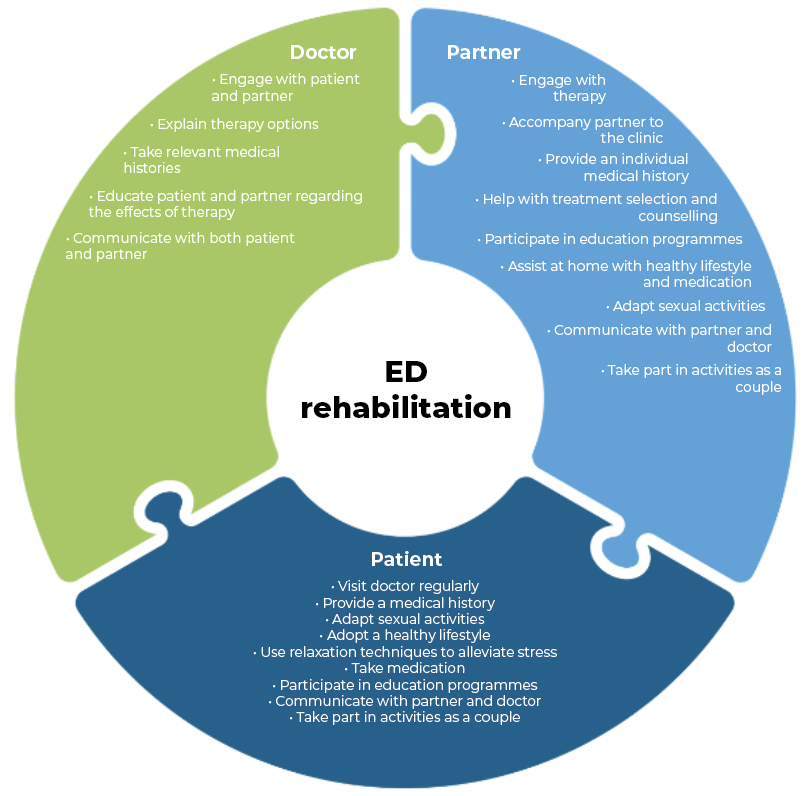
- Erectile Dysfunction
- Erectile Dysfunction
Psychological Complexity of Erectile Dysfunction in Relationships
Written by: Editors
Modified on:
This article discusses the psychological impact of erectile dysfunction (ED) on both men and women within relationships. It explores how ED, and its sexual impact, can affect relationships based on commitment, communication, honesty, responsibility and vulnerability. Read on for insights and practical solutions to tackle these challenges together.

Communication, honesty, taking responsibility and vulnerability are important aspects of relationships. When erectile dysfunction (ED) affects your sexual intimacy, overcoming these challenges can be daunting.
Often, embarrassment and shame are common reactions in men with ED, especially when erection problems occur not only now and then, but often during sexual contact. However, ignoring the problem can make it worse and lead to relationship problems.
Not discussing erection problems with your partner can lead to feelings of self-blame, anxiety, insecurity, pain, and even anger. Lack of knowledge about erectile dysfunction can cause one partner to associate the other’s inability to get an erection with a loss of libido or infidelity. It's crucial to acknowledge these concerns and talk openly about them to avoid misunderstandings and becoming emotionally detached from your partner.
Feeling at ease, trust, openness and communication
You can still enjoy physical contact, even when sexual intercourse is not possible. Concentrate on exploring other pleasurable activities you can do together, such as stroking or giving each other a massage. Relax and enjoy each other's company. Talk with each other, spend quality time together.
For more in-depth information, you can always contact an expert or request a consultation through us.
Treatment options
When erection problems occur, it is important to identify the source of the problem: an approach that looks at both physical and mental health can put you on a pathway to recovery and well-being. Here are some key steps to understand and effectively address the causes of erectile dysfunction, ranging from medical examinations to a healthy lifestyle.
- Get a physical exam: Make an appointment with your doctor to rule out health risks or medical causes for your erection problems.
- Discuss your medicine use with your healthcare provider: Talk to your doctor about the effects of prescription medications on sexual performance and explore possible alternatives.
- Professional help: Consider getting professional help from a sex therapist if you and your partner are struggling with ED.
- Get treatment for mental health issues: Face your anxiety, stress, depression and relationship issues and deal with these psychological effects of erectile dysfunction. See a psychologist or psychiatrist.
- Live a healthy lifestyle: Regular exercise, a balanced diet and stress management will help you fight effects of erectile dysfunction. Quit smoking for better sexual health.
What to do if your partner has ED?
An ED diagnosis does not mean the end of your sexual and emotional relationship. Dealing with your partner's erection problems requires patience, understanding and open communication.
- Offer support while remaining sensitive to your partner's needs.
- Acknowledge the problem without blaming your partner.
- Try to alleviate your partner's performance anxiety.
- Try to relax.
- Focus on improving physical intimacy.
- Engage in your partner’s treatment.
Consider getting professional help from a sex therapist and discover what treatment options could be effective. Go to your partner's therapy sessions.

What to avoid as a partner?
While it's crucial to focus on your partner, it's essential that you engage in the process and feel comfortable. Don’t withdraw from your partner or abstain from having sex. This can lead to misunderstandings and exasperate the problem.
Intimacy and ageing
As we age, sexuality in long-term relationships often transforms into something else, a broader spectrum, in which the focus shifts from sexual intercourse to other forms of connection.
For some elderly people, being less sexually active means room for other gratifying experiences. Alternative pastimes, such as a shared hobby or going for walks in nature, can add a new level of enjoyment and intimacy to the relationship. Embracing this broad spectrum can enrich relationships, promote a healthy lifestyle and contribute to a diverse experience of sexuality at this stage in life.
Having a healthy sex life later in life can have many benefits, including positive psychological effects. Sex promotes relaxation, sleep and natural pain relief, which can be especially beneficial to elderly people. What’s more, intimacy enhances self-esteem. There are also physical benefits: having sex reduces the risk of cardiovascular disease and prostate cancer, and it’s also a great cardio exercise. It is important to recognise the positive impact of sexuality in old age and to see this aspect of the relationship in a broader light, namely, that of health and well-being.
Conclusion
In this article, we explored the psychological impact of erectile dysfunction (ED) on both men and women in relationships. We emphasised the importance of open communication, understanding and a joint approach to the challenges that come with having ED. Not talking about ED can lead to miscommunication and cause emotional distance between partners. As a partner of someone with ED, you can play an important role in supporting them by redefining healthy intimacy and working together towards a solution. We also recommend getting professional help, if necessary. These approaches will not only help to reduce the impact of ED, but also to maintain a strong emotional connection.
Sources
https://goldenstateurology.com/erectile-dysfunction-and-relationships/
https://seksualiteit.nl/tips-tools/erectie-oefening/
https://www.thuisarts.nl/seks/ik-wil-weten-hoe-seks-kan-veranderen-als-ik-ouder-word
https://www.thuisarts.nl/seks/elkaar-strelen-en-masseren-niet-penis-vagina-anus-en-borsten
https://www.thuisarts.nl/seks/elkaar-strelen-of-masseren-ook-penis-vagina-anus-en-borsten